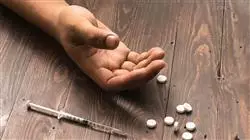University certificate
The world's largest faculty of psychology”
Why study at TECH?
This Postgraduate certificate is unique for the multitude of techniques and tools that we give to the psychologist so that they can specialize in the intervention of addictions”

According to the Spanish Ministry of Health, Social Services and Equality, the consumption of cannabis and cocaine has increased by 50% in recent years among the population between 15-54 years old. It is especially common among secondary school students, with consumption being most common among males. The Spanish Observatory on Drugs and Drug Addiction in its 2016 report states that the most consumed substance is alcohol. It estimates that 1,600,000 people (5% of the population) aged 15 to 64 years demonstrate high-risk alcohol consumption, with binge drinking tripling in the last decade.
Therefore, the use and/or dependence on psychoactive substances constitutes a serious public health problem. This leads to serious problems in the three areas in which health is understood from the biopsychosocial model: problems in the sphere of physical, psychological and social health, not only during the moment of consumption, but also in the future health of the individual. Within this framework, treatments and care protocols are being developed to intervene in addictive disorders.
In recent decades, addictions have been added to those where there is no substance that produces dependence, but a habit or behavior. This is the case of pathological gambling and addiction to new technologies, which are causing serious psychological and social health problems in adults and young people. For these cases, Psychology has also developed treatments that seek the reduction and elimination of such habits and behaviors.
Also, the graduate will have the opportunity to take part in a Masterclass of the highest quality, integrated with the innovative multimedia resources available in TECH's extensive library, specifically designed for this program. This additional lesson, elaborated by a renowned international specialist in Behavioral Neuroscience, will enable psychologists to perfect their skills in the Updated Taxonomy of Addictions, all with the quality guarantee that only TECH offers.
You will have access to a unique and complementary Masterclass, elaborated by an internationally recognized specialist in Behavioral Neuroscience. Bet on TECH!”
This Postgraduate certificate in Updated Taxonomy of Addictions contains the most complete and up-to-date scientific program on the market. The most important features include:
- Clinical cases presented by experts in psychology
- The graphic, schematic, and practical contents with which they are created provide scientific and practical information on the disciplines that are essential for professional practice
- New diagnostic and therapeutic developments in the Updated Taxonomy of Addictions
- An algorithm-based interactive learning system for decision-making in the clinical situations presented throughout the course
- With special emphasis on evidence-based psychology and research methodologies in psychology
- All of this will be complemented by theoretical lessons, questions to the expert, debate forums on controversial topics, and individual reflection assignments
- Content that is accessible from any fixed or portable device with an Internet connection
This Postgraduate certificate is the best investment you can make in the selection of a refresher program for two reasons: in addition to updating your knowledge in Updated Taxonomy of Addictions, you will obtain a degree from TECH Global University”
It includes in its teaching staff health professionals belonging to the field of Updated Taxonomy of Addictions, who pour into this specialization the experience of their work, in addition to recognized specialists belonging to leading scientific societies.
Thanks to its multimedia content developed with the latest educational technology, it will allow the professional a situated and contextual learning, that is to say, a simulated environment that will provide an immersive learning programmed to prepare in real situations.
The design of this program focuses on Problem-Based Learning, by means of which the psychologist will have to try to solve the different professional practice situations that will arise throughout the academic course. To do so, they will have the help of an innovative interactive video system created by recognized experts in the field of Updated Taxonomy of Addictions and with great teaching experience.
Make the most of the opportunity to update your knowledge in Current Taxonomy of Addictions through classical methods to improve your professional practice"

The Postgraduate certificate includes real clinical cases and exercises to bring the development of the course closer to the psychologist's clinical practice"
Syllabus
The structure of the contents has been designed by a team of professionals who recognize the implications of the program in the daily praxis of the psychologist in Current Taxonomy of Addictions, aware of the relevance of current specialization to treat the patient with psychological disorders and committed to quality teaching using new educational technologies.

This Postgraduate certificate in Updated Taxonomy of Addictions contains the most complete and updated program on the market”
Module 1. Current Classification of Addictions and Their Basic Concepts
1.1. Situation of Drugs at the International Level
1.2. Epidemiology of Addictions
1.3. Neurobiology of Addiction
1.4. Psychosocial Factors Related to Addictions
1.5. The Role of the Psychologist in the Treatment of Addictions
1.6. Classification of Substances Which Lead to Addiction
1.7. Basic Concepts in Addictions: Use, Abuse, Dependence, Tolerance, Abstinence, Craving, Polyconsumption
1.8. Classification of Disorders Related to Substance Abuse and Addictive Disorders
1.9. Classification of Non-Substance-Related Addictive Disorders
1.10. Comorbidity and Dual Pathology
Module 2. Assessment, Prevention and Psychological Treatment in Addictions
2.1. Assessment of the Physical Field and General State of Health
2.2. Assessment Through Laboratory Tests
2.3. Assessment of Neuropsychological Aspects
2.4. Assessment of Personality and Its Disorders
2.5. Assessment of Mental State and Its Disorders
2.6. Assessment of the Severity of Addiction to Substances
2.7. Assessment of the Severity of Addiction Not Related to Substances
2.8. Assessment of Psychosocial Aspects
2.9. Prevention of Addictions
2.10. Principles to Follow in the Treatment of Addictions
2.11. Therapeutic Objectives in the Treatment of Addictions and Motivation Towards Change
2.12. Transtheoretical Model
2.13. Cognitive-Behavioural Treatment: Commonly Used Techniques
2.14. Treatment Oriented Towards the Family
2.15. Group Therapy
2.16. Other Focuses of Treatment
2.17. Care Resources and Devices and Addiction Treatment

A unique, key, and decisive experience to boost your professional development”
Postgraduate Certificate in Updated Taxonomy of Addictions
The term “drug” (in its most common social meaning) is used to refer to the psychoactive substance that generates dependence in the consumer, however, to what extent can we broaden the connotations of this meaning? If the drug is that “something” that generates addiction while it significantly affects cognitive and/or emotional processes, becoming an obstacle to healthy personal development, then the concept can be applied to elements that do not necessarily fall into the field of drug addiction: gambling, sex or even social networks, for example. Knowing that a deepening of these new aspects is strictly necessary, TECH Global University presents the Postgraduate Certificate in Updated Taxonomy of Addictions: a detailed vision of the cases of physical and psychological dependence that have more interference in the detriment of the quality of modern life: from the well-known PAS (Psychoactive Substances) to the addictive disorders of objects other than narcotics. With this program you will be able to develop in a highly professional way in one of the most specialized areas of psychology.
Dare to study the world of addictions
The list of illustrious artists who have been ruined by the abuse of certain substances is so long that we would need an encyclopedia of several volumes to complete the list. How can we remain indifferent when the next individual susceptible to being dragged into a narcotics overdose could (under the right guidance) become the future artist who changes the world? The same case applies to other types of addictions that slow down the progress of the individual: compulsive gambling, for example, at the economic level, or addiction to new technologies at the level of interaction with the real world. As a proposal for social transformation, our Postgraduate Certificate will train you with the most suitable skills so that you can not only practice with the confidence of an expert, but also be an agent of change and well-being for countless lives.







